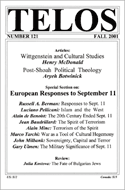 The terrorist attacks on 9/11 created a chain of events that has led not only to the “othering” of Islam and its followers, but also to an increase in the securitization of society as a whole. In “Sovereignty, Empire, Capital, and Terror,” John Milbank examines the aftermath of the 9/11 terrorist attacks, notably the wars in Iraq and Afghanistan and the increasing intervention of governments into the privacy of their respective populations. He questions the wars and the increasingly illiberal turn by the government in regards to dealing with terrorists and criminals and the elimination of due process and, in some cases, habeus corpus. He writes that, “the question that one should ask in response to the immediate aftermath the events of September 11 is why there was outrage on such a gigantic scale” (146). He goes on to identify two reasons: first, the threat against the sovereign, and second, the increasing legitimization by Western governments to intervene in so-called “rogue or failed states,” to ensure the spread of the neoliberal market and prevent the defection of these states from the Western dominated capitalist system. Although there are indeed questions concerning the delineation between national security and the democratic process, the answers to these questions are harder to come by.
The terrorist attacks on 9/11 created a chain of events that has led not only to the “othering” of Islam and its followers, but also to an increase in the securitization of society as a whole. In “Sovereignty, Empire, Capital, and Terror,” John Milbank examines the aftermath of the 9/11 terrorist attacks, notably the wars in Iraq and Afghanistan and the increasing intervention of governments into the privacy of their respective populations. He questions the wars and the increasingly illiberal turn by the government in regards to dealing with terrorists and criminals and the elimination of due process and, in some cases, habeus corpus. He writes that, “the question that one should ask in response to the immediate aftermath the events of September 11 is why there was outrage on such a gigantic scale” (146). He goes on to identify two reasons: first, the threat against the sovereign, and second, the increasing legitimization by Western governments to intervene in so-called “rogue or failed states,” to ensure the spread of the neoliberal market and prevent the defection of these states from the Western dominated capitalist system. Although there are indeed questions concerning the delineation between national security and the democratic process, the answers to these questions are harder to come by.
|
|
||||
|
Telos Press Publishing · PO Box 811 · Candor, NY 13743 · Phone: 212-228-6479 Privacy Policy · Data Protection Copyright © 2024 Telos Press Publishing · All Rights Reserved |
||||







